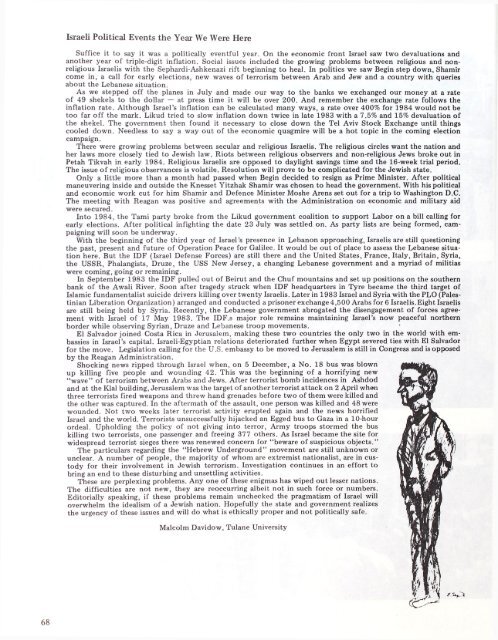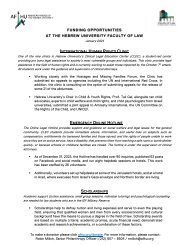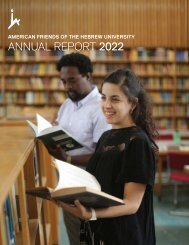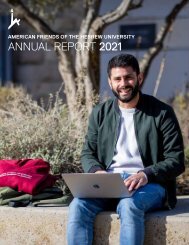Create successful ePaper yourself
Turn your PDF publications into a flip-book with our unique Google optimized e-Paper software.
Israeli P olitical E vents th e Year We Were Here<br />
Suffice it to say it was a politically eventful year. On the economic front Israel saw two devaluations and<br />
another year of triple-digit inflation. Social issues included the growing problems between religious and nonreligious<br />
Israelis with the Sephardi-Ashkenazi rift beginning to heal. In politics we saw Begin step down, Shamir<br />
come in, a call for early elections, new waves of terrorism between Arab and Jew and a country with queries<br />
about the Lebanese situation.<br />
As we stepped off the planes in July and made our way to the banks we exchanged our money at a rate<br />
of 49 shekels to the dollar — at press time it will be over 200. And remember the exchange rate follows the<br />
inflation rate. Although Israel’s inflation can be calculated many ways, a rate over 400% for <strong>1984</strong> would not be<br />
too far off the mark. Likud tried to slow inflation down twice in late <strong>1983</strong> with a 7.5% and 15% devaluation of<br />
the shekel. The government then found it necessary to close down the Tel Aviv Stock Exchange until things<br />
cooled down. Needless to say a way out of the economic quagmire will be a hot topic in the coming election<br />
campaign.<br />
There were growing problems between secular and religious Israelis. The religious circles want the nation and<br />
her laws more closely tied to Jewish law. Riots between religious observers and non-religious Jews broke out in<br />
Petah Tikvah in early <strong>1984</strong>. Religious Israelis are opposed to daylight savings time and the 16-week trial period.<br />
The issue of religious observances is volatile. Resolution will prove to be complicated for the Jewish state.<br />
Only a little more than a month had passed when Begin decided to resign as Prime Minister. After political<br />
maneuvering inside and outside the Knesset Yitzhak Shamir was chosen to head the government. With his political<br />
and economic work cut for him Shamir and Defence Minister Moshe Arens set out for a trip to Washington D.C.<br />
The meeting with Reagan was positive and agreements with the Administration on economic and military aid<br />
were secured.<br />
Into <strong>1984</strong>, the Tami party broke from the Likud government coalition to support Labor on a bill calling for<br />
early elections. After political infighting the date 23 July was settled on. As party lists are being formed, campaigning<br />
will soon be underway.<br />
With the beginning of the third year of Israel’s presence in Lebanon approaching, Israelis are still questioning<br />
the past, present and future of Operation Peace for Galilee. It would be out of place to assess the Lebanese situation<br />
here. But the IDF (Israel Defense Forces) are still there and the United States, France, Italy, Britain, Syria,<br />
the USSR, Phalangists, Druze, the USS New Jersey, a changing Lebanese government and a myriad of militias<br />
were coming, going or remaining.<br />
In September <strong>1983</strong> the IDF pulled out of Beirut and the Chuf mountains and set up positions on the southern<br />
bank of the Awali River. Soon after tragedy struck when IDF headquarters in Tyre became the third target of<br />
Islamic fundamentalist suicide drivers killing over twenty Israelis. Later in <strong>1983</strong> Israel and Syria with the PLO (Palestinian<br />
Liberation Organization) arranged and conducted a prisoner exchange4,500 Arabs for 6 Israelis.Eight Israelis<br />
are still being held by Syria. Recently, the Lebanese government abrogated the disengagement of forces agreement<br />
with Israel of 17 May <strong>1983</strong>. The IDF.s major role remains maintaining Israel’s now peaceful northern<br />
border while observing Syrian, Druze and Lebanese troop movements.<br />
El Salvador joined Costa Rica in Jerusalem, making these two countries the only two in the world with embassies<br />
in Israel’s capital. Israeli-Egyptian relations deteriorated further when Egypt severed ties with El Salvador<br />
for the move. Legislation calling for the U.S. embassy to be moved to Jerusalem is still in Congress and is opposed<br />
by the Reagan Administration.<br />
Shocking news ripped through Israel when, on 5 December, a No. 18 bus was blown<br />
up killing five people and wounding 42. This was the beginning of a horrifying new<br />
“wave” of terrorism between Arabs and Jews. After terrorist bomb incidences in Ashdod<br />
and at the Klal building, Jerusalem was the target of another terrorist attack on 2 April when<br />
three terrorists fired weapons and threw hand grenades before two of them were killed and<br />
the other was captured. In the aftermath of the assault, one person was killed and 48 were<br />
wounded. Not two weeks later terrorist activity erupted again and the news horrified<br />
Israel and the world. Terrorists unsuccessfully hijacked an Egged bus to Gaza in a 10-hour<br />
ordeal. Upholding the policy of not giving into terror, Army troops stormed the bus<br />
killing two terrorists, one passenger and freeing 377 others. As Israel became the site for<br />
widespread terrorist sieges there was renewed concern for “beware of suspicious objects.”<br />
The particulars regarding the “Hebrew Underground” movement are still unknown or<br />
unclear. A number of people, the majority of whom are extremist nationalist, are in custody<br />
for their involvement in Jewish terrorism. Investigation continues in an effort to<br />
bring an end to these disturbing and unsettling activities.<br />
These are perplexing problems. Any one of these enigmas has wiped out lesser nations.<br />
The difficulties are not new, they are reoccurring albeit not in such force or numbers.<br />
Editorially speaking, if these problems remain unchecked the pragmatism of Israel will<br />
overwhelm the idealism of a Jewish nation. Hopefully the state and government realizes<br />
the urgency of these issues and. will do what is ethically proper and not politically safe.<br />
Malcolm Davidow, Tulane University<br />
י<br />
68

















